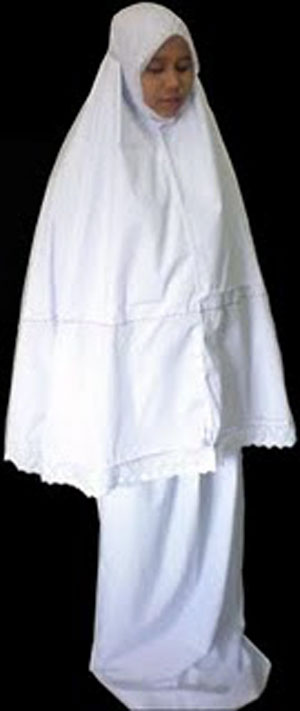
Question
What is the evidence that a women must cover everything except her face and hands while she is praying?
Answer
The majority of the scholars hold the opinion that the whole body of the woman is `awrah in prayer. However, they all agree that she may uncover her face. Ibn `Abd al-Barr asserts that there is juristic consensus (ijmâ') on this issue. He writes: “They have agreed that the woman may expose her face in prayer.”
Regarding the hands, there have been some scholars who have considered them to be part of the `awrah of the woman, ruling that they should be covered. However, the vast majority of the scholars hold the opinion that they are not `awrah.
Likewise, a decent majority of scholars agree that the feet do not have to be covered. This is the opinion preferred by Ibn Taymiyah. I also support this opinion. Nevertheless, it is preferred for the woman to cover her feet in prayer.
In case the woman prays where strangers can see her, then should cover her face in the same way that she does at other times when she is in public and not in prayer.
The evidence that a woman must cover her `awrah in prayer is that the Prophet (peace be upon him) said: “Allah will not accept a prayer from a woman who (has reached the age where she) menstruates except with wearing her head covering.” [Related in the four Sunan compilations and Musnad Ahmad. It was classified as good hadîth by al-Tirmidhî and authenticated by Ibn Khuzaymah]
The meaning of the phrase “a woman who menstruates” is an adult woman. In other words, the prayer from any women after attaining puberty will not be accepted without her wearing her head covering. The word used for “head covering” is khimâr, which is a cloth that covers the head and the neck.
The following has been cited as evidence by some of those who support that the feet need to be covered from the top: It was related that Umm Salamah asked the Prophet (peace be upon him): “Could a woman pray in a gown and a head covering without a waistcloth?”
The Prophet (peace be upon him) said: “Yes, if the gown is long and covers her feet from above.” [Sunan Abî Dâwûd].
However, Ibn Hajr, as quoted in Subul al-Salâm, says regarding this hadîth: “The scholars have concluded that these words are not attributable to the Prophet (peace be upon him) himself.”
Therefore, it does not stand as evidence.
And Allah knows best.
Regarding the hands, there have been some scholars who have considered them to be part of the `awrah of the woman, ruling that they should be covered. However, the vast majority of the scholars hold the opinion that they are not `awrah.
Likewise, a decent majority of scholars agree that the feet do not have to be covered. This is the opinion preferred by Ibn Taymiyah. I also support this opinion. Nevertheless, it is preferred for the woman to cover her feet in prayer.
In case the woman prays where strangers can see her, then should cover her face in the same way that she does at other times when she is in public and not in prayer.
The evidence that a woman must cover her `awrah in prayer is that the Prophet (peace be upon him) said: “Allah will not accept a prayer from a woman who (has reached the age where she) menstruates except with wearing her head covering.” [Related in the four Sunan compilations and Musnad Ahmad. It was classified as good hadîth by al-Tirmidhî and authenticated by Ibn Khuzaymah]
The meaning of the phrase “a woman who menstruates” is an adult woman. In other words, the prayer from any women after attaining puberty will not be accepted without her wearing her head covering. The word used for “head covering” is khimâr, which is a cloth that covers the head and the neck.
The following has been cited as evidence by some of those who support that the feet need to be covered from the top: It was related that Umm Salamah asked the Prophet (peace be upon him): “Could a woman pray in a gown and a head covering without a waistcloth?”
The Prophet (peace be upon him) said: “Yes, if the gown is long and covers her feet from above.” [Sunan Abî Dâwûd].
However, Ibn Hajr, as quoted in Subul al-Salâm, says regarding this hadîth: “The scholars have concluded that these words are not attributable to the Prophet (peace be upon him) himself.”
Therefore, it does not stand as evidence.
And Allah knows best.
-islamtoday.net

._001.jpg) This is the final chapter of Quran and it is the second in a pair of chapters that were revealed at the same time. These six short verses and the previous chapter are generally thought to have been revealed in Mecca, although there is some scholarly dispute about this. Their subject matter and themes are similar, and they are known together as the ‘chapters of refuge'. Both the final two chapters are used as invocations against evil. The title of this chapter is ‘The People’. It is named for the last word in the first verse where God refers to Himself as the Lord of all the people.
This is the final chapter of Quran and it is the second in a pair of chapters that were revealed at the same time. These six short verses and the previous chapter are generally thought to have been revealed in Mecca, although there is some scholarly dispute about this. Their subject matter and themes are similar, and they are known together as the ‘chapters of refuge'. Both the final two chapters are used as invocations against evil. The title of this chapter is ‘The People’. It is named for the last word in the first verse where God refers to Himself as the Lord of all the people.